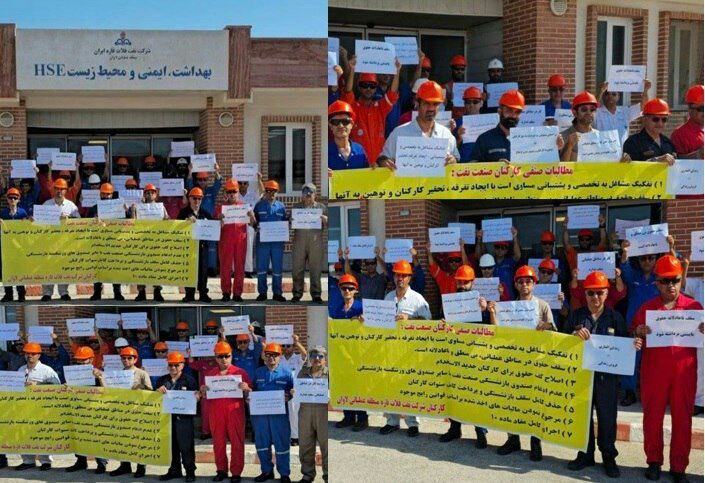
On Friday, June 21, 2024, the Council for Organizing Protests of Contract Oil Workers reported that over three thousand workers and employees across thirty companies went on strike by handing over their work tools. Both the Council for Organizing Protests of Contract Oil Workers and the Council for Organizing Protests of Informal Oil Workers (Third Parties) called for a widespread strike to make it easier to achieve the workers’ demands, based on the readiness present in the oil companies.
The main demands of the oil workers are salary increases and a 14-day work, 14-day rest schedule. Contract project workers in the oil industry are demanding the elimination of contractors and equal pay for equal work. This is a widespread demand in the oil industry. The intense summer heat has begun, making working conditions extremely unbearable. Under such conditions, improving working conditions, dormitories, and dining facilities also become top priority demands of particular importance.
Radical labor activists have called the new wave of work stoppages the third “14-14 Campaign” and noted that recent strikes have succeeded despite the schemes and sabotage by company and military agents. The Council for Organizing Protests of Informal Oil Workers (Third Parties) has emphasized the complete elimination of contractors and raised other demands such as “the full implementation of the second phase of the job classification plan, non-discriminatory allocation of benefit cards and perks, and access to banking facilities like other oil sectors.” Addressing the saboteurs among themselves and their supporters, the labor activists have written that they are not committed to the production and profitability of a corrupt and mafia-like system that plunders oil and brings nothing but general discrimination and misery for workers and the oppressed people. They have also dismissed the promises of some presidential candidates to dismantle contracting companies in the oil sector as empty promises. They stressed that, given the contractors’ ties to those in power, this demand can only be realized through the unified and persistent struggle of the workers themselves.
The new wave of strikes, which has significant potential for expansion among oil workers, began during a period when six candidates selected by the Guardian Council made baseless promises to raise wages. Some went further and pledged to eliminate contractors. These are the contractors that Khatam-al Anbiya Construction Headquarters tried to dismantle during Ahmadinejad’s presidency to take over their place. However, the aforementioned mafia was so powerful and well-positioned at that time that it thwarted the efforts of the named right-wing populist cabinet. It should also be noted that the workers’ demand to eliminate contractors is fundamentally different from the military’s demand. Workers want to eliminate contractors to reclaim the wages plundered by the contractors and to gain job security by signing direct contracts with the oil company itself. They do not want to replace one group of vultures with another group of armed thieves.
In the past two periods of the “14-14 Campaign,” the striking contract oil workers achieved improvements in wages and living conditions in the camps, but most contractors reneged on their promises once the workers returned to work. Naturally, in this period, contract workers will strive to avoid returning to work with minimal achievements and, anticipating employer deceit, will seek more concrete results. Activists among project workers and third-party workers know that it is necessary to strengthen the unity of these groups with official workers during the process of attracting other contract workers. They also need to consider the interests of temporary and day laborers in oil and petrochemical companies and prepare the ground to attract them to the ranks of the strikers. Continuing this struggle will allow the leading workers to strengthen existing organizations against company security agents, Basijis, and military personnel, and especially to enhance the quality of the fight against traitorous elements within their own ranks.
Oil is the lifeblood of all layers of the Islamic Republic. Only by endangering the production of this black gold can striking workers force the oil company to seriously address their demands and eventually submit. However, to achieve their demands, it is crucial that labor activists in the oil industry fully support the free and independent women, the claimants, anti-execution activists, the release of political prisoners, environmental defense, and similar causes, thereby directing the workers’ mass struggles towards a deep connection with the “Zhina Revolutionary Movement.”
Of course, raising political demands and staunchly defending the living branches of the Zhina Revolution could expose the workers to severe attacks from the regime’s repressive forces. However, with the weakening of the regime and its repressive forces, the continuation of social and political struggles in society and within prisons, and the presence of protesting activists outside Iran alongside their support for the clashes of militant forces with the regime inside, the repressive forces will become less capable and more susceptible to defeat.

